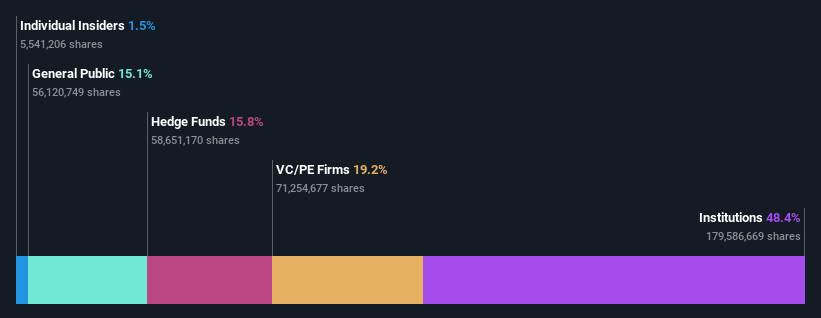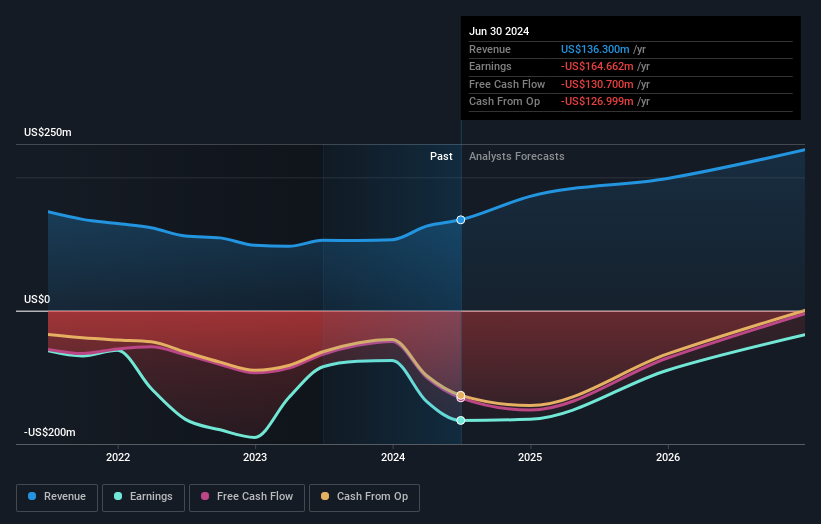- United States
- /
- Life Sciences
- /
- NasdaqGS:LAB
Institutional owners may consider drastic measures as Standard BioTools Inc.'s (NASDAQ:LAB) recent US$74m drop adds to long-term losses

Key Insights
- Significantly high institutional ownership implies Standard BioTools' stock price is sensitive to their trading actions
- 51% of the business is held by the top 4 shareholders
- Using data from analyst forecasts alongside ownership research, one can better assess the future performance of a company
If you want to know who really controls Standard BioTools Inc. (NASDAQ:LAB), then you'll have to look at the makeup of its share registry. We can see that institutions own the lion's share in the company with 48% ownership. Put another way, the group faces the maximum upside potential (or downside risk).
And institutional investors endured the highest losses after the company's share price fell by 9.2% last week. Needless to say, the recent loss which further adds to the one-year loss to shareholders of 34% might not go down well especially with this category of shareholders. Institutions or "liquidity providers" control large sums of money and therefore, these types of investors usually have a lot of influence over stock price movements. As a result, if the decline continues, institutional investors may be pressured to sell Standard BioTools which might hurt individual investors.
Let's take a closer look to see what the different types of shareholders can tell us about Standard BioTools.
Check out our latest analysis for Standard BioTools

What Does The Institutional Ownership Tell Us About Standard BioTools?
Many institutions measure their performance against an index that approximates the local market. So they usually pay more attention to companies that are included in major indices.
As you can see, institutional investors have a fair amount of stake in Standard BioTools. This can indicate that the company has a certain degree of credibility in the investment community. However, it is best to be wary of relying on the supposed validation that comes with institutional investors. They too, get it wrong sometimes. It is not uncommon to see a big share price drop if two large institutional investors try to sell out of a stock at the same time. So it is worth checking the past earnings trajectory of Standard BioTools, (below). Of course, keep in mind that there are other factors to consider, too.

Our data indicates that hedge funds own 16% of Standard BioTools. That's interesting, because hedge funds can be quite active and activist. Many look for medium term catalysts that will drive the share price higher. Looking at our data, we can see that the largest shareholder is Casdin Capital, LLC with 19% of shares outstanding. For context, the second largest shareholder holds about 16% of the shares outstanding, followed by an ownership of 11% by the third-largest shareholder.
To make our study more interesting, we found that the top 4 shareholders control more than half of the company which implies that this group has considerable sway over the company's decision-making.
While it makes sense to study institutional ownership data for a company, it also makes sense to study analyst sentiments to know which way the wind is blowing. Quite a few analysts cover the stock, so you could look into forecast growth quite easily.
Insider Ownership Of Standard BioTools
While the precise definition of an insider can be subjective, almost everyone considers board members to be insiders. Company management run the business, but the CEO will answer to the board, even if he or she is a member of it.
I generally consider insider ownership to be a good thing. However, on some occasions it makes it more difficult for other shareholders to hold the board accountable for decisions.
Our most recent data indicates that insiders own some shares in Standard BioTools Inc.. It has a market capitalization of just US$791m, and insiders have US$12m worth of shares, in their own names. This shows at least some alignment. You can click here to see if those insiders have been buying or selling.
General Public Ownership
The general public-- including retail investors -- own 15% stake in the company, and hence can't easily be ignored. This size of ownership, while considerable, may not be enough to change company policy if the decision is not in sync with other large shareholders.
Private Equity Ownership
With a stake of 19%, private equity firms could influence the Standard BioTools board. Sometimes we see private equity stick around for the long term, but generally speaking they have a shorter investment horizon and -- as the name suggests -- don't invest in public companies much. After some time they may look to sell and redeploy capital elsewhere.
Next Steps:
It's always worth thinking about the different groups who own shares in a company. But to understand Standard BioTools better, we need to consider many other factors. Like risks, for instance. Every company has them, and we've spotted 3 warning signs for Standard BioTools (of which 2 shouldn't be ignored!) you should know about.
Ultimately the future is most important. You can access this free report on analyst forecasts for the company.
NB: Figures in this article are calculated using data from the last twelve months, which refer to the 12-month period ending on the last date of the month the financial statement is dated. This may not be consistent with full year annual report figures.
New: Manage All Your Stock Portfolios in One Place
We've created the ultimate portfolio companion for stock investors, and it's free.
• Connect an unlimited number of Portfolios and see your total in one currency
• Be alerted to new Warning Signs or Risks via email or mobile
• Track the Fair Value of your stocks
Have feedback on this article? Concerned about the content? Get in touch with us directly. Alternatively, email editorial-team (at) simplywallst.com.
This article by Simply Wall St is general in nature. We provide commentary based on historical data and analyst forecasts only using an unbiased methodology and our articles are not intended to be financial advice. It does not constitute a recommendation to buy or sell any stock, and does not take account of your objectives, or your financial situation. We aim to bring you long-term focused analysis driven by fundamental data. Note that our analysis may not factor in the latest price-sensitive company announcements or qualitative material. Simply Wall St has no position in any stocks mentioned.
About NasdaqGS:LAB
Standard BioTools
Provides instruments, consumables, reagents, and software services for researchers and clinical laboratories in the Americas, Europe, the Middle East, Africa, and the Asia pacific.
Excellent balance sheet and fair value.


